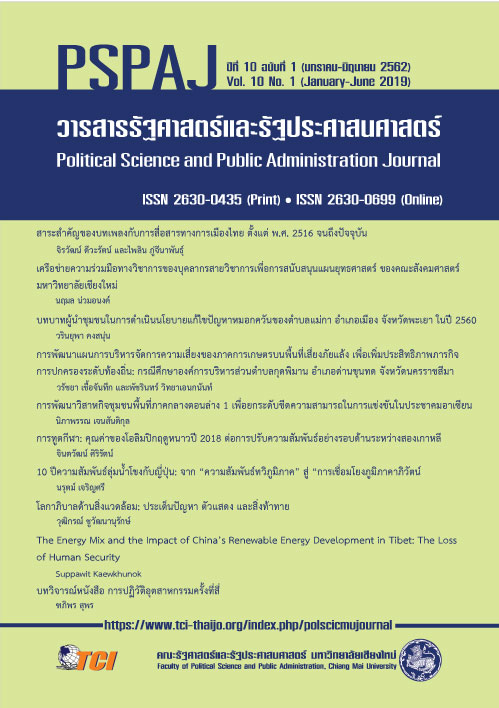เครือข่ายความร่วมมือทางวิชาการของบุคลากรสายวิชาการ เพื่อการสนับสนุนแผนยุทธศาสตร์ของคณะสังคมศาสตร์ มหาวิทยาลัยเชียงใหม่
Main Article Content
บทคัดย่อ
การศึกษาวิจัยครั้งนี้มีวัตถุประสงค์เพื่อสำรวจความคิดเห็นและสรุปข้อมูลเครือข่ายความร่วมมือทางวิชาการของคณาจารย์และนักวิจัยในสังกัดคณะสังคมศาสตร์ มหาวิทยาลัยเชียงใหม่ และหาแนวทางส่งเสริมการสร้างเครือข่ายความร่วมมือทางวิชาการระหว่างสถาบัน เพื่อสนับสนุนแผนยุทธศาสตร์ของคณะสังคมศาสตร์ สร้างความเข้มแข็งเป็นเลิศทางวิชาการ และบรรลุเป้าประสงค์ตามวิสัยทัศน์ของคณะฯ โดยการศึกษาวิจัยได้อาศัยข้อมูลทุติยภูมิในรายงานสรุปข้อมูลเครือข่ายความร่วมมือทางวิชาการ และการสำรวจความคิดเห็นของบุคลากรสายวิชาการในสังกัดเกี่ยวกับการสร้างและพัฒนาเครือข่ายโดยการสัมภาษณ์แบบมีโครงสร้าง ผลการศึกษาวิจัยพบว่า คณะฯ มีเครือข่ายความร่วมมือทางวิชาการแทบทุกภูมิภาคทั่วโลก โดยบุคลากรสายวิชาการเห็นว่าคณะฯ สามารถกำหนดแนวทางการส่งเสริมและพัฒนาเครือข่ายทางวิชาการเพื่อสนับสนุนแผนยุทธศาสตร์ได้ 3 แนวทาง คือ (1) การจัดทำแผนยุทธศาสตร์แบบบนลงล่าง โดยมุ่งเป้าและกำหนดแผนยุทธศาสตร์เป็นหลัก (2) การจัดทำแผนยุทธศาสตร์แบบล่างขึ้นบน โดยให้อิสระทางความคิดและวิชาการแก่บุคลากร ให้ความสำคัญกับเครือข่ายทางวิชาการที่มีอยู่เดิมและมีความเข้มแข็ง และ (3) การจัดทำยุทธศาสตร์แบบผสมสาน ดำเนินการควบคู่กันทั้งการจัดทำแผนยุทธศาสตร์แบบบนลงล่างและแบบล่างขึ้นบน โดยกำหนดสัดส่วนให้เหมาะสมกับรูปแบบและวัฒนธรรมองค์กรของส่วนงาน ซึ่งบุคลากรสายวิชาการของคณะฯ ร้อยละ 42.55 เห็นว่าควรวางแผนยุทธศาสตร์ในแบบล่างขึ้นบน และร้อยละ 38.30 เห็นว่าควรจัดทำยุทธศาสตร์แบบผสมผสาน มีเพียงร้อยละ 19.15 เท่านั้น ที่เห็นว่า
ควรจัดทำยุทธศาสตร์แบบบนลงล่าง นอกจากนี้ บุคลากรสายวิชาการ ร้อยละ 74.47 เห็นว่าทิศทางในการพัฒนาเครือข่ายทางวิชาการของบุคลากรไม่จำเป็นต้องสอดคล้องกับแผนยุทธศาสตร์ของคณะฯ เสมอไป ทั้งนี้ เมื่อดำเนินการมาระยะหนึ่งแล้วคณะฯ ควรมีการปรับแผนยุทธศาสตร์ เพื่อให้สอดคล้องตรงกันกับความเชี่ยวชาญและความต้องการของคณาจารย์ในที่สุด และแสดงให้เห็นถึงความมีส่วนร่วมของบุคลากรในการพัฒนาแผนยุทธศาสตร์ของคณะฯ ส่งผลถึงความยั่งยืนขององค์กรในระยะยาวต่อไป
Downloads
Article Details
- เนื้อหาและข้อมูลที่ลงตีพิมพ์ในวารสารรัฐศาสตร์และรัฐประศาสนศาสตร์ถือเป็นข้อคิดเห็นและความรับผิดชอบของผู้เขียนบทความโดยตรง ซึ่งกองบรรณาธิการวารสารรัฐศาสตร์และรัฐประศาสนศาสตร์ ไม่จำเป็นต้องเห็นด้วย หรือร่วมรับผิดชอบใดๆ
- บทความและข้อมูล ที่ได้รับการตีพิมพ์ในวารสารรัฐศาสตร์และรัฐประศาสนศาสตร์ ถือเป็นลิขสิทธิ์ของวารสาร หากบุคคลหรือหน่วยงานใดต้องการนำข้อมูลไปใช้ประโยชน์ในทางวิชาการ ขอให้อ้างอิงแหล่งที่มาด้วย
เอกสารอ้างอิง
กองแผนงาน. (ม.ป.ป.). แผนพัฒนาการศึกษามหาวิทยาลัยเชียงใหม่ ระยะที่ 12 (2560-2564). เชียงใหม่: สำนักงานมหาวิทยาลัย มหาวิทยาลัยเชียงใหม่.
ขนิฏฐา กาญจนรังสีนนท์. (ม.ป.ป.). เครือข่ายเพื่อการพัฒนา. สืบค้นเมื่อ 21 กุมภาพันธ์ 2560, จาก https://asapake.tripod.com/k10.htm
จรวยพร ธรณินทร์. (2550, ตุลาคม). การสร้างความเข้มแข็งในการบริหารจัดการแบบเครือข่าย. เอกสารประกอบการบรรยาย วันที่ 25 ตุลาคม 2550 ณ โรงแรมรามาการ์เดน กรุงเทพฯ.
พระมหาสุทิตย์ อาภากโร. (2547). เครือข่าย: ธรรมชาติ ความรู้ และการจัดการ. กรุงเทพฯ: โครงการเสริมสร้างการเรียนรู้เพื่อชุมชนเป็นสุข (สรส.).
ภัทรวรรธน์ นิลแก้วบวรวิชญ์. (2559). รูปแบบการพัฒนาเครือข่ายความร่วมมือทางวิชาการของสำนักงานเขตพื้นที่การศึกษาประถมศึกษาสังกัดสำนักงานคณะกรรมการการศึกษาขั้นพื้นฐาน. (วิทยานิพนธ์ปรัชญาดุษฎีบัณฑิต), คณะศึกษาศาสตร์ มหาวิทยาลัยบูรพา.
มูลนิธิสถาบันวิจัยและพัฒนาองค์กรภาครัฐ. (2558). หลักสูตรเทคโนโลยีสารสนเทศและการสื่อสารเพื่อการบริหารงานภาครัฐที่ดี. สืบค้นเมื่อ 15 พฤษภาคม 2561, จาก www.irdp.org/2015/user_upload/BIGG_8_Document_Ver2_20150716173225.pdf
อัจฉรา ภูริคุปต์. (2549). การเสริมสร้างและพัฒนาระบบบริหารแบบเครือข่าย. ใน นราธิป ศรีราม. (บก.). การบริหารองค์กรภาครัฐ. (น. 13-1-13-40). นนทบุรี: มหาวิทยาลัยสุโขทัยธรรมาธิราช.


